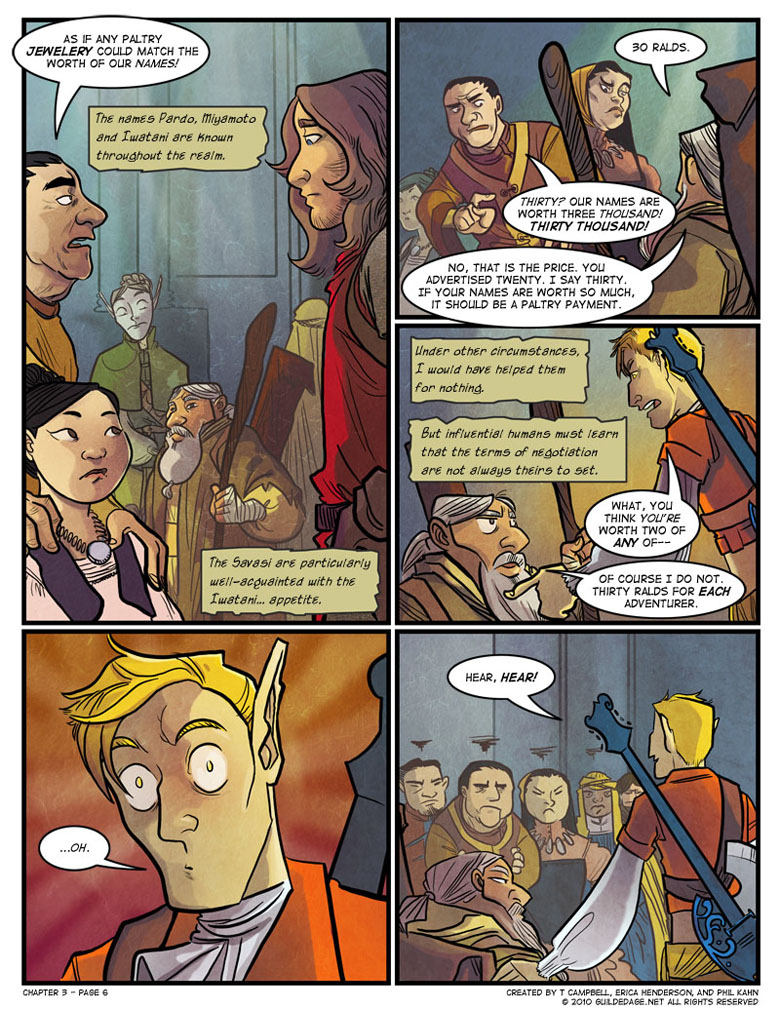Annotated 3-6
There’s no getting around it: this version of His Grace Iwatani really does not feel like the one we will start seeing in his next speaking appearance, which will be… (checks notes)… er, Chapter 15. We cover as best we can by having him say at one point that one doesn’t express one’s true feelings in front of commoners, but the master manipulator whom we present later would hardly be blustering like this. At worst, he’d be focused on getting his son and heir back, and at best, he’d be figuring out how to use the legendary, and apparently really easy to manipulate, “prophecied-one Best’s” presence to his later political advantage.
The most generous reading I can give is that Iwatani is deeply, deeply concealing his nature here in line with his philosophy of “waiting until the right time to act.” Still.
On the other hand, such blustering is extremely in character for Miyamoto. If only we could go back and… but no, that way lies OCD.
 A word, by the way, about “prophecied-one Best.” When writing this scene, I realized that Payet Best’s legendary status was in interesting contrast to his station as a “shit elf.” This is not a complete contradiction: many cultures have accorded a few members of a despised or derided race “exceptional” status, which reinforces the myth that they live in a pure meritocracy and that all those other shit elves [substitute your example of choice here] just aren’t trying hard enough. If this sort of thing really interests you, I recommend O.J.: Made In America.
A word, by the way, about “prophecied-one Best.” When writing this scene, I realized that Payet Best’s legendary status was in interesting contrast to his station as a “shit elf.” This is not a complete contradiction: many cultures have accorded a few members of a despised or derided race “exceptional” status, which reinforces the myth that they live in a pure meritocracy and that all those other shit elves [substitute your example of choice here] just aren’t trying hard enough. If this sort of thing really interests you, I recommend O.J.: Made In America.











What are the Iwatani… appetites mentioned here?
I believe it has to do with land. Vast tracts of Savasi land.
Of course, in our world “Iwatani” created Pac-Man, who had quite the appetite himself…so it works on two levels!
Didn’t know that about Pac-Man, cheers.
Most of the heads of houses have last names taken from video game developers.
I hear they’re threatening legal action if T and Phil don’t give them back soon.
I choose to believe that the Iwatanis are big fans of traditional dwarf cuisine.
Possibly made from traditional dwarfs. You know, the pure ones without all the additives.
Best apparently cannot math well, if he thinks that thirty is twice as much as twenty. Either that or he’s rounding up from 1.5 to 2 for the sake of hyperbole.
“He thinks that thirty is twice as much as twenty. And that’s terrible.”
In more ways that one, too.
I didn’t want to double post and it didn’t go with the other post but, what the heck:
That’s what the alt text is joking about, by the way.
I thought I’d already read the alt-text for this one, but obviously I forgot.
Ah yes, the good ‘ole ‘bitches betta rec’nize!’ negotiation tactic.
That is acceptable. My rate is also 30 ralds per adventurer. *eyebrow wiggle*
Avatar appropriateness: 100%
Nice work by Gravedust here. I like how he’s willing to step out of his own morality when people really deserve to have it stuck to them a little bit.
And people say Best is arrogant and doesn’t compromise. :P
The “Best gets it” background effect on panel 4 is admirably subtle; in most comics that use such things, they are far too blatant and cartoonish.
“What kind of names do you think we have?!”
“We’ve already established that. Now we’re just haggling over the price.”